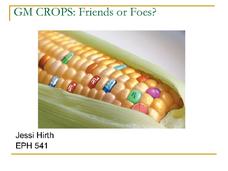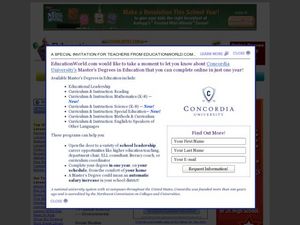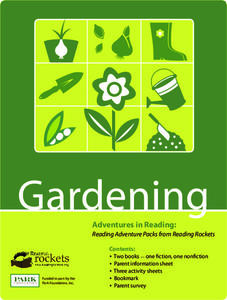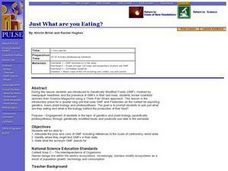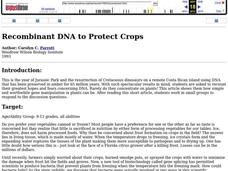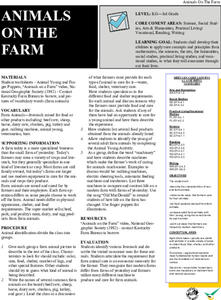Curated OER
GM Crops: Friends or Foes?
Genetically modified crops—How do you feel about them? Here, explore the benefits and risks of GM crops to inform your opinion.
Foreign Policy Association
U.S. and Europe Online Lesson Plan
Class groups investigate the economic and political implications of a country's policies on genetically modified foods, craft a position paper detailing that policy, and share their findings with the class. Armed with this...
California Academy of Science
Exploring the Impacts of Feeding the World
Approximately 50 percent of people in the world who are chronically hungry work in agriculture. While it seems counter-intuitive, the farther you live from a farm, the more food options are available. Scholars explore concepts related to...
Curated OER
An International Dinner Table
Students investigate the origins of several crops eaten in the United States today. The facto0rs that influence consumer choices and the influences on the American population as to eating preferences are discussed in this lesson.
Curated OER
"Cereal" Comic Strip
Learners discuss how wheat is important to our everyday lives, from food to insulation, focusing on how wheat grains are processed into food items. Students then create a comic strip of the steps of processing grain to demonstrate...
Curated OER
Agriculture and Food
Students discuss the foods they eat and why they eat them. In this nutrition lesson, students determine what foods people might eat in Cyprus and create a traditional meal tasting five traditional recipes of Cyprus set up like...
Curated OER
Countries, Food, and Culture
Students examine foods from other countries. In this multicultural lesson, students write down names of different restaurants and categorize pictures of foods according to the specific restaurant. For example, Won Ton Soup would be...
Curated OER
Kansas Foods A Data and Probability Investigation
Students study a number of food products and anticipate which are derived from Kansas crops. They make a list of words associated with the food stuffs and graph the results.
Curated OER
New Food Saves Lives, Could End Hunger
Students locate the country of Niger, then read a news article about a new type of food that is being used to fight childhood hunger in Africa. In this current events instructional activity, the teacher introduces the article with map...
Out-of-School Time Resource Center
Nutrition and Physical Activity
Emerging nutritionists explore what it means to be healthy. In the beginning of the unit, your class will examine the five food groups and learn how food gets from the farm to our plates. This leads into the investigation of...
PBS
Reading Adventure Pack: Gardening
A Reading Adventure Pack invites scholars to start gardening. Following a reading of two books—fiction and nonfiction—young green thumbs repurpose food containers to grow an herb garden in their kitchen, plant seeds in starter pots out...
Curated OER
Colony Crops
Fifth graders determine which crops were grown in the 13 colonies depending on their climate and geography. They explore what crops are grown in the states created from the original colonies.
Curated OER
Agriculture- It's More Than You Think
Students research careers in agriculture. In this agricultural lesson, students discover the various careers related to agriculture. Students construct resumes and "apply" for agricultural jobs.
Earth Day Network
The Neolithic Revolution
With the abundance of food products we can easily access in our society today, it is easy to forget the toll this can take on our global environment. Young learners will discover how the transition to agriculture and domesticated living...
Curated OER
Just What are you Eating?
Students identify and articulate pros and cons of genetically modified foods (GMF) including references to scale of controversy worldwide. Students then identify where they might find GMFs in their diets, read different opinion pieces on...
Curated OER
Recombinant DNA to Protect Crops
Students are asked to recount their greatest hopes and fears concerning DNA. One article states how worthwhile gene manipulation in plants can be. Classroom discussions arise after reading one article on this issue.
PBS
Reading Adventure Pack: Farms
A Reading Adventure Pack features a fiction and nonfiction text—The Oxcart Man by Donald Hall and illustrated by Barbara Cooney and Farming by Gail Gibbons. Following the readings, scholars make a collage showcasing foods farmed from...
Curated OER
Where Does It Come From?
Learners explore where agricultural commodities used in snack foods are grown. They choose a snack food and locate the top five states that produce the food that the snack is made from.
Curated OER
Animals on the Farm
Students work in groups to create a description of a farm animal. Other classmates try to guess the animal. The class discusses what farmers need to provide for each animal on their farm (food, shelter, veterinary care). Students...
Curated OER
Maintaining Plant Genebanks
Students examine the use, costs, and the need for plant gene banks. The rationale for gaining ownership over scientific information and the implications of the developing nations' reliance on biotechnology is explored in this lesson plan.
Curated OER
Altered Genes
Learners describe the economic relationship between farmers, consumers, and food companies. They examine the issues regarding the reactions of consumers in this country and other countries to the use of gene-altered crops in food...
Curated OER
Rice: The Global Crop
Students understand the uniqueness of the rice plant and how it grows. Students compare rice growing in Indonesia and California, observing the steps common to the process everywhere. Students comprehend the concepts labor-intensive and...
Agriculture in the Classroom
Farmland: GMOs and Organic Agriculture
Learn more about genetic modification, organic farming, and the role of biotechnology in agriculture by watching a documentary that shows how newly gained knowledge can be applied to specific situations involving farmers and the choices...
Curated OER
What's Organic?
Students discuss background information presented by the teacher and read dictionary definitions for the words "organic" and "synthetic." In this gardengin instructional activity, students complete a worksheet on the material. Students...
